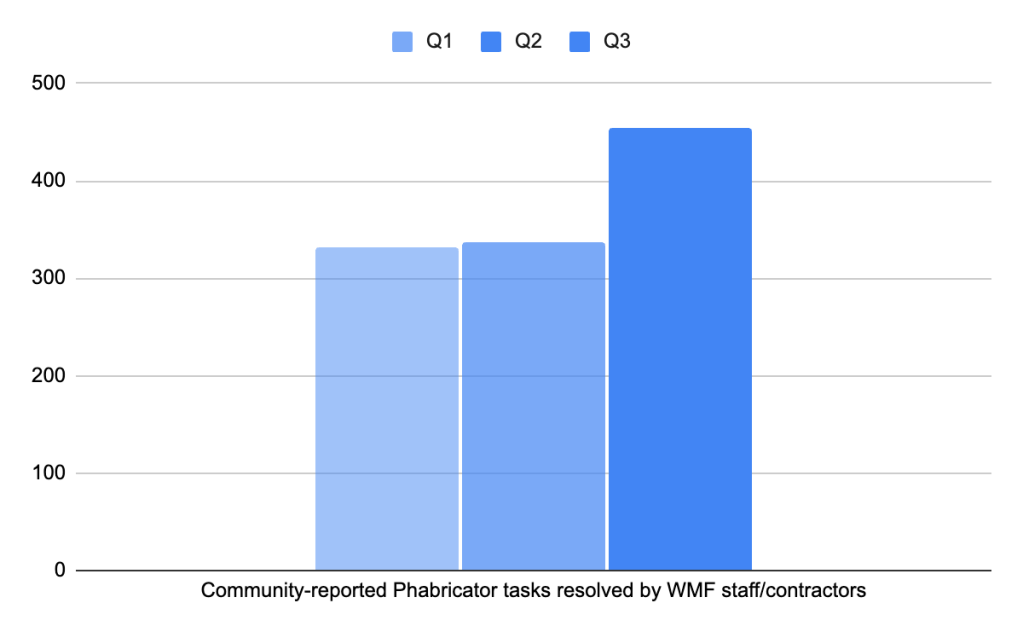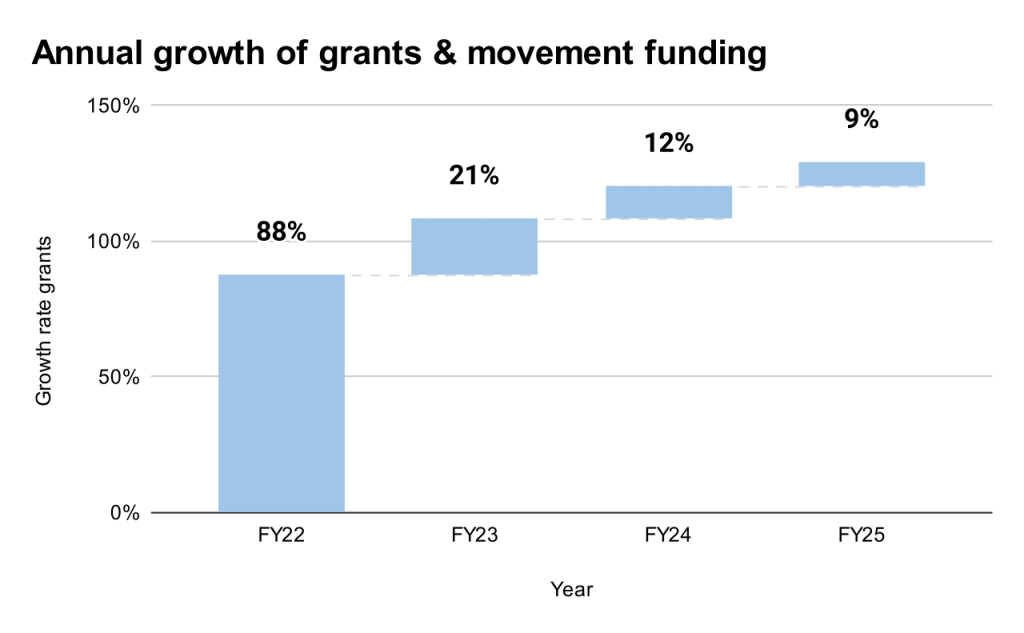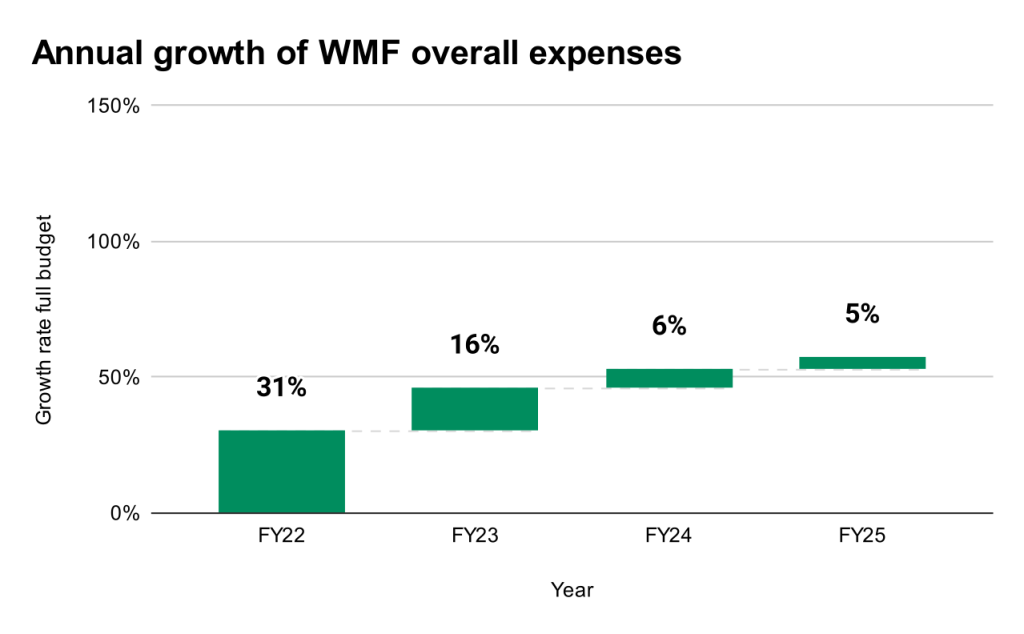
As discussed in the January 2024 post about our progress on the 2023-2024 Annual Plan goals, we have centered this year’s goals around our Product and Technology work, in service of the broader movement strategy goals to advance the 2030 Strategic Direction. Our annual plan recognizes Wikimedia’s role as a platform for people to contribute on a massive scale, and prioritizes four key goals to meaningfully evolve the work we do and meet the changing world around us. Hundreds of Wikimedians shaped this annual plan both on and off wiki.
This is the third part of a two-part update. Read part two in this post.
The four key annual plan goals
The annual plan laid out these four key goals:
- INFRASTRUCTURE: Advance Knowledge as a Service. Improve User Experience on the wikis, especially for established editors. Strengthen metrics and reporting.
- EQUITY: Support Knowledge Equity. Strengthen Equity in Decision-Making via Movement governance and Movement Charter. Empower and engage the Movement, support regional strategies and help close knowledge gaps.
- SAFETY & INCLUSION: Protect against growing external threats. Defend our people and projects against disinformation and harmful government regulation. Work across the Movement to Provide for the Safety of Volunteers.
- EFFECTIVENESS: Strengthen our overall performance. Evaluate, Iterate, and Adapt our processes for maximum impact with more limited resources.
Here’s a summary of the Foundation’s progress, broken down by these four goals.
Infrastructure
Our Infrastructure goal is about improving the user experience on the Wikimedia projects. This goal forms the largest portion of the Foundation’s budget, highlighting our focus on product and technology.
Editors with extended rights
This year we committed to delivering improvements to four workflows over the course of the year that help editors with extended rights (admins, patrollers, functionaries, and moderators of all kinds). These editors do critical work that makes our wikis function. They’re administrators, patrollers, and other kinds of functionaries. They’re on the receiving end of incoming edits and new contributions, and they can revert and block users when necessary. They help make our encyclopedia trustworthy. So far this year we’ve delivered five interventions to make their work easier and more efficient: Edit Check, PageTriage, Edit Patrol on Android, Release Rights improvements in Upload Wizard, and the Watchlist on iOS. Two more are in progress to be completed before the end of the year: Community Configuration 2.0, and Automoderator.
As part of this work to help support new volunteers becoming successful contributors and reduce moderator burdens, we have begun deploying Edit Check tools to MediaWiki’s Visual Editor. Initial testing of this feature shows that contributors are 2.2x more likely to add a citation to the site, and the revert rate of edits made decreased by 8.3%. These significant changes demonstrate how useful the feature can be for newcomers. We are continuing to test out new additions to this feature set, including how we may apply AI assistance. The tool has been deployed to 11 small wikis and enabled for new contributors by default, and we are continuing to test it on 11 other medium to large size wikis to refine how it works and identify any potential bugs in the code.
Also as part of improvements for editors with extended rights, Edit Patrol within the Wikipedia Android app is now available in Production for Spanish and French Wikipedia.
Supporting Wikimedia events
Wikimedia events are held around the world, organized by dozens of different communities and groups in order to bring together new contributors and experienced editors to add content and technical contributions to the Wikimedia projects. Our latest Event Registration tool allows organizers to create and manage their events on the wikis, and allows participants to sign up and receive updates. In the inaugural quarter, it was used to create 224 events with collectively 3,232 participants. Next, the Campaigns product and the Community Growth teams are collaborating to integrate grants information into the Events Registration tool. We expect 300-400 additional events per year will utilize this feature and facilitate faster and more efficient reporting of event outcomes.
Responding to other community needs
In addition to implementing improvements to our Community Wishlist process, we also deployed a number of features requested by the community:
- Edit Recovery has been deployed on all wikis. This community requested feature allows for saving wikitext and other edit form information while typing, and restoring it after the browser has been accidentally closed, or a power or network outage or browser crash has happened.
- QR share, which allows users to generate a 1-click QR code for any wiki page, has been deployed on all wikis.
- Multiblocks schema changes, allowing for layered blocking of malicious users, have been successfully deployed to production wikis, and rollout to all projects is planned for the upcoming week.
- CodeMirror 6, which aims to make it easier for contributors to edit wikitext, is in beta testing.
- AutoSuggestSiteLink is a MediaWiki gadget that suggests Wikidata items for possible linking with a Wikimedia site page.
- The Who Wrote That Extension is back up and running on the Google Chrome Store.
Improvements to the MediaWiki and Wikimedia wikis infrastructure
Overall, we deployed over 35 new features or improvements to the MediaWiki and Wikimedia wikis infrastructure, including:
- MediaWiki 1.42.0-wmf.16 deployed, including 316 Patches in 71 repos by 75 authors.
- MediaWiki 1.42.0-wmf.23 deployed; 414 Patches in 101 repos by 85 authors.
- Temporary accounts can now be hidden, to avoid accidental IP address leaks.
- A new CAPTCHA system has been successfully deployed to production after a combined effort from SRE, security team and volunteers. Not only is the new CAPTCHA more secure, but early signs are showing it is more accessible to non-Latin text based speaking users due to clearer legibility.
- A native editor is in production in the Wikipedia iOS app, accumulating data for reporting.
- trace.wikimedia.org is up and running. Now, we’re not only able to enjoy the traces, but we can also access them at an optimal speed.
- Translation page filter for Special:PrefixIndex has been deployed to all wikis using the Translate extension.
- Foundation staff helped organize and participated in the 2024 Bellagio AI Symposium. The group published a draft of potential research areas.
- A new type is now available for use by the Wikifunctions Community: Natural numbers!
- We have significantly reduced the time it takes for regular maintenance of DNS hosts, down from 30-45 minutes of on-hands maintenance to a single command by moving to a dynamic confd based management of state from the earlier Puppet defined state. This will reduce toil for the Traffic team and in general make our infrastructure more resilient, allowing us to depool DNS hosts in a few seconds versus the above time frame.
- SecurityPatchBot checks security patches nightly then pings the patch author in Phabricator as soon as a patch is out-of-date—which means fewer manual steps for Security and Release Engineering and less train delay.
- We landed a big milestone for how Types can use Functions to check inputs as you enter them. You can try it out on Wikifunctions Beta to see multiplication work for Roman numerals, for example.
- We ran a successful Datacenter Switchover, moving all wikis from our primary data center (in this instance, Texas) to the secondary data center (in this instance, Virginia).
- The config store configuration now features 5 data sets that are being processed on the production cluster into temporary tables, parallel to the current production output. On the k8s deployment side, a new, simplified service runner implementation has been done, enabling the subsequent deployment of the service.
- The first version of Night Mode is now deployed to production. Night mode is available to logged-in users on French, Spanish, Farsi, Polish, Serbian, Turkish, and Vietnamese Wikipedias.
- Rewrite of LoadMonitor (T314020) has been merged and will be deployed soon. This made protection against certain types of outages much stronger.
- We have integrated MADLAD-400, the new translation model from Google Research, into the MinT test instance.
- We have enabled Content and Section Translation for 28 Wikipedias, with MinT support on 22 of them using the new MADLAD-400 model from Google Research.
- We launched the 2024 Community Insights survey, covering 29 languages with questions on our Movement’s demographics, motivations, and health.
- We replaced an expensive feature of Flagged Revisions (which contributed to an outage earlier this year) with a simpler functionality that’s mostly transparent to the users, while removing tens of gigabytes from every database host on average (and massive amount of read and writes removed from these databases).
- 109 different staff across the Foundation worked to resolve 454 community reported phabricator tasks.

- 3256 tools were migrated as part of the Toolforge’s migration off of the Grid Engine.
Equity
To further our equity goal, we have been working closely with Affiliates to form strategic partnerships to close content gaps. We also amplified and supported community gender gap campaigns in biographies and women’s health during Women’s History Month. This included running the Wikipedia Needs More Women campaign (14.5M Unique people reached) and coordinating the global landing page and calendar for Celebrate Women campaign. We also supported the rollout of ¡Alto! Mujeres haciendo historia campaign in Latin America (344 new standard quality biographies on es- and ptwiki were created). Finally, we also supported Wikimedia Indonesia’s women’s health campaign.
To identify improvements to the onboarding of new languages, we also conducted a series of community conversations on the state of the Incubator and shared data on Incubator graduation and editing trends, as well as the state of languages across Wikimedia projects.
Work was also done to build the capacity of Affiliates to implement global programs locally. For example, Wikimedia Colombia & the Ministry of Education launched Reading Wikipedia in the Classroom in Waayuunaiki community; and wrapped a 6 month Wiki Loves Manuscripts Learning Partners cohort – 21 participants from 15 languages in 6 regions, with 11 communities intending to pursue manuscript digitization projects next year.
To improve connections within the movement, we celebrated 10 Wikimedians from 7 language communities through WikiCelebrate. We also facilitated the first-ever Arabic Let’s Connect session and continued to co-create new spaces for the community to connect. We also provided communications and event programming support to regional (ESEAP, WikiArabia, Francophone WikiConf, WikiIndaba) and thematic (Global Advocacy) conferences.
Safety and Inclusion
The Foundation’s safety and inclusion work revolves around defending our people and projects against disinformation and harmful government regulation, and providing for the safety of volunteers. As the political and human rights landscape continues to rapidly evolve in the world around us, the work of our Legal, Trust & Safety, and Human Rights teams has evolved to keep pace.
As Wikipedia is increasingly regarded as a reliable source of knowledge, we are seeing two large trends. Politicians have a greater stake in what appears on Wikipedia and take actions to influence on-wiki content, directly or indirectly. Additionally, some politicians and governments who do not like what appears on Wikipedia are making deliberate efforts to discredit our people and projects through disinfo campaigns in mainstream and social media.
Our Disinformation working group will continue to work with wiki communities and contributors to counter any disinformation efforts on our projects, and protect the contributors targeted by efforts to discredit them or their work.
We have continued to engage with regulators to educate them on our model. In February, we responded to a consultation on illegal harms by Ofcom, the regulator of the UK Online Safety Act, pushing back against proposals that would undermine effective volunteer community self-governance. In March, we attended a roundtable with the Group Director of Online Safety. And speaking of safety, following the publication of our first child rights impact assessment, the Foundation launched a new child safety policy to better protect our younger users.
Part of our work includes providing support for community self-governance; in addition to seating the new members of Affiliations Committee, Ombuds Commission, and Case Review Committee, we supported a Community vote on the final Charter of the Universal Code of Conduct Coordinating Committee (U4C) in January, which was approved with a strong mandate (75%) in February.
Effectiveness
The Effectiveness goal is about improving how we as an organization operate and scale. This year, we are already on track to increase the percentage of our budget that goes to directly supporting Wikimedia’s mission. In concrete terms, this means that, through increasing our internal efficiency around administrative and fundraising costs, we will enable an additional investment of $1.8M into funding for things like grants, feature development, site infrastructure and more.


Our financial modeling still indicates that, for a range of reasons, fundraising online and through banners will not continue to grow at the same rate as in past years. We have several long-term initiatives underway to help mitigate this risk and diversify our revenue streams, including Wikimedia Enterprise, the Wikimedia Endowment, growing major gifts and testing new revenue streams.
Evaluating progress
We will continue to measure our impact on these four goals through four key metrics, which you can learn more about and read the most recent published results on Meta-Wiki. We are constantly feeding our data back into the process, iterating based on what we have been successful at impacting and what we have not been as successful at impacting. We look forward to reporting on more progress throughout the rest of the year.

Can you help us translate this article?
In order for this article to reach as many people as possible we would like your help. Can you translate this article to get the message out?
Start translation